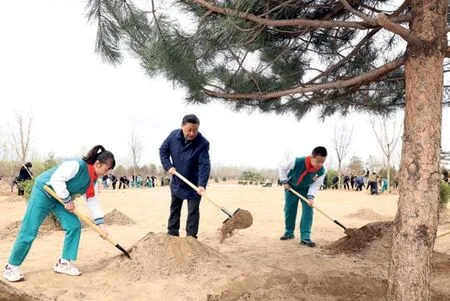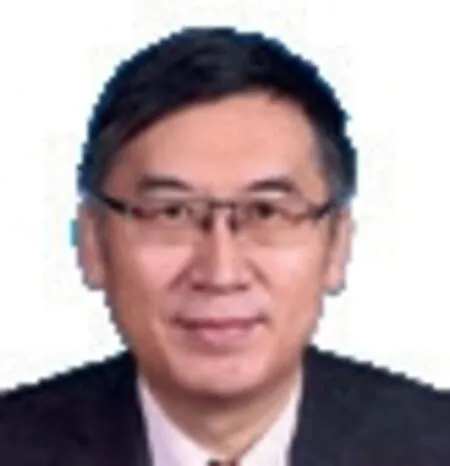THIS WEEK
DIGGING IN!

Chinese President Xi Jinping joins a tree-planting activity in Beijing’s Daxing District on March 30 in honor of Arbor Day.
Xi said he did so to personally contribute to the building of a beautiful China and to encourage the whole of society,especially the younger generations, to push for ecological advancement so that the nation’s environment will become even better.
A Green Slate
A park in Xiongan New Area in Hebei Province on March 30. This is an important ecological and leisure space for the new area and will open to the public soon.
Fitness Facilities
China plans to build 2,000 fitness facilities, including sports parks, across the country by 2025, a sports official said on March 30.
The country will also complete 5,000 projects addressing weaknesses in sports and fitness facilities at the township level,said Li Jianming, Deputy Director of the General Administration of Sport, at a press conference regarding a newly-released guideline on building a higherlevel public service system for fitness and physical activity.
Priority should be given to allocating resources to ensure that urban and rural residents can enjoy equal access to basic public services, with policymaking weighted toward the country’s western regions, rural areas and areas with financial difficulties, Li added.
The guideline emphasizes efforts in promoting social sports organizations and communitylevel fitness, and bringing more benefits of competitive sports to everyone, according to Zhao Chenxin, Secretary-General of the National Development and Reform Commission.
It also highlights protecting the sports rights and interests of the elderly, disabled and other vulnerable groups, promoting more participation of all age groups in sports, Zhao said.
By 2025, the per-capita area of sports venues in China is expected to reach 2.6 square meters, while 38.5 percent of the population will be taking part in regular exercise, the document said, adding that by 2035, the participation rate should exceed 45 percent.
Live-Streaming Regulation
Chinese authorities will increase efforts to tighten the regulation of the country’s live-streaming sector, Xinhua News Agency reported on March 30.
The management of livestreaming account registration will be enhanced, according to a circular jointly issued by the Cyberspace Administration of China, the State Taxation Administration and the State Administration for Market Regulation.
Live-streaming platforms,alongside live-streamers, will not be permitted to sell products to consumers by rumor-mongering or false publicity, the circular said.
The platforms and related institutions should fulfill their obligations to withhold and pay individual income taxes as required, and anyone who commits tax evasion, or any other tax-related crime, will be brought to justice in accordance with the law, it said.
The circular also noted that the authorities will protect the lawful rights and interests of the platforms, institutions and livestreamers.
Medical Waste
China has managed COVID-19 related medical waste and sewage in a smooth and orderly manner, with sufficient disposal capacity, said the Ministry of Ecology and Environment (MEE)on March 30.
As of late 2021, China was capable of treating around 2.15 million tons of medical waste per year through centralized disposal, a figure 39 percent greater than at the end of 2019,MEE official Ren Yong told a press conference.
The country’s emergency disposal capacity for medical waste is almost 2 million tons per year, Ren added.
The ministry has ensured the timely and effective collection and treatment of medical waste and sewage in the medium and high-risk areas for COVID-19, and has guided local governments to supervise sewage treatment in designated hospitals and urban sewage treatment plants.
The ministry has also strengthened source access management and promoted environmental risk control for toxic and harmful chemicals, such as persistent organic pollutants,endocrine disruptors, antibiotics and microplastics.
Education Platform
A national smart platform was launched on March 28 to provide a range of education-related public services, according to the Ministry of Education.
The platform, Smartedu.cn,integrates China’s platforms for primary and middle school education, vocational education and higher education, and the platform for employment services for college graduates. It will provide users with a wide array of courses and educational services.
TCM Development
The Chinese Government has issued a new five-year plan for the development of traditional Chinese medicine (TCM).
According to the plan,released by the General Office of the State Council, by 2025,the capacity of health services provided by TCM will be significantly enhanced, while the policy and system for the highquality development of TCM will be further improved, making use of its unique strengths in building a healthy China.
The plan outlines key tasks to be implemented during the period, such as building a sound TCM service system, fostering specialists in TCM, and developing a high-level system for TCM inheritance, protection and innovation.
The plan also emphasizes combining TCM and modern science and integrating Chinese and Western medicine to better protect people’s health.
IP Education
China will intensify efforts toward cultivating intellectual property(IP) talent, the country’s top IP regulator said on March 30,adding that the country plans to achieve the goal of having more than 1 million IP professionals by 2025.
Talent is the most basic and key element for building a strong IP power, said Feng Zhaolong, a first-class inspector of the China National Intellectual Property Administration, at a press conference.
Feng added that the number of IP professionals in China is now 690,000, and more than 50 universities nationwide have established IP colleges, providing strong support for the industry’s development.
Sun Wei, an official in charge of IP training at the administration, said nearly 2 million students from 1,400 primary and middle schools in China have received IP-related education.
A total of 165 schools have been identified as national-level IP pilot schools, Sun added,noting that there are thousands of trained full- and part-time teachers nationwide and several relevant textbooks have been published.
Highlighting the use of online learning platforms, Sun said the administration has developed 24 online platforms offering more than 570 courses and receiving over 9 million hits.
To further promote online education, the administration will work with social media platforms to popularize IP knowledge and introduce high-quality foreign courses for young Chinese, Sun added.
Dancing in the Sky
Black-necked cranes in flight in Namling County of Xigaze City, Tibet Autonomous Region, on March 29. Tibet has seen a steady increase in its populations of endangered wildlife over recent decades. The population of black-necked cranes was previously 1,000 to 3,000, but now exceeds 10,000.
Bagging the Harvest

Local women pick tea leaves at a tea garden in Shanglin County,Guangxi Zhuang Autonomous Region, on March 30.
Financing Support
Private enterprises in hi-tech and strategic emerging industries will receive support in issuing bonds to raise funds, the China Securities Regulatory Commission (CSRC)said on March 27. It added that efforts will be made to further optimize the financing service mechanism and improve the efficiency of financing.
The CSRC encourages market and policy institutions to provide credit-enhancement support for the bond financing of private enterprises.
Other measures include facilitating the repurchase financing mechanism, encouraging financial institutions to expand business engagement with private firms, and improving the quality of information disclosure.
Industrial Profits
Profits of major industrial firms rose 5 percent year on year in the first two months of 2022,official data showed on March 27.
Industrial firms, each with annual main business revenue of at least 20 million yuan ($3.14 million), saw their combined profits reach 1.16 trillion yuan ($182.4 billion), the National Bureau of Statistics said.
The revenues of those firms went up 13.9 percent year on year to 19.4 trillion yuan ($3 trillion), and 21 in 41 industries saw growth in profits.
At the end of February, their assets totaled 142.24 trillion yuan($22.4 trillion), up 10.4 percent year on year. Their liabilities reached 80.03 trillion yuan ($12.6 trillion), up 10.2 percent. The ratio of liabilities to assets was 56.3 percent, down 0.1 percentage point year on year.
Auto Market
The share of Chinese passenger car brands in the domestic market increased to 44.6 percent in the first two months of the year, up 2.2 percentage points year on year, data from the China Association of Automobile Manufacturers showed.
Over 1.63 million Chinese brand passenger cars were sold nationwide during the period,surging 20.3 percent year on year.
In February alone, sales of Chinese passenger car brands soared 27.9 percent year on year to roughly 634,000 units, with their market share basically unchanged from the same period last year.
Power Investment
Major Chinese power generation enterprises saw surging investment in solar power projects in the first two months of the year, the National Energy Administration said.
Their input skyrocketed 153.7 percent year on year to 9.4 billion yuan ($1.47 billion).
The companies’ total investment in power construction projects in the period, however,went down 1.9 percent to 47.1 billion yuan ($7.4 billion).
Funds channeled to hydropower came in at 12.3 billion yuan ($1.9 billion), down 19.6 percent from the same period last year, while those to power grid projects jumped 37.6 percent to 31.3 billion yuan ($4.9 billion).
Trust Assets
The trust industry reported steady expansion in 2021, reversing the shrinking trend since 2018, industry data showed.
The outstanding trust assets reached 20.55 trillion yuan ($3.23 trillion) by late 2021, up 0.29 percent from the previous year,according to the China Trustee Association (CTA).
It marked an increase of 110 billion yuan ($17.3 billion), or 0.52 percent, from that at the end of last September.
The scale of assets managed by the trust industry reported negative growth from 2018 to 2020, Zhou Xiaoming, a nonexecutive director of the CTA, said.Despite the shrinkage, the operating income of the industry remained relatively stable, CTA data showed.

Last year, the profit of the industry totaled 60.17 billion yuan($9.5 billion), up 3.17 percent year on year, according to the association.
Cloud Spending
Nationwide expenditure on cloud infrastructure services hiked 45 percent year on year to $27.4 billion last year, according to technology market research firm Canalys.
COVID-19-triggered demand, including telework,online learning and e-commerce,remained a key growth driver,Canalys said, adding that as more traditional companies became keen on digital transformation, demand for cloud services also increased.
The top four cloud service providers in the country were Alibaba Cloud, Huawei Cloud,Tencent Cloud and Baidu AI Cloud, which accounted for over 80 percent of total expenditure,the company said.
It expects the cloud infrastructure market in China to reach $85 billion by 2026.
Green Credit
Outstanding green credit of 21 major Chinese banks reached 15.1 trillion yuan ($2.37 trillion) by late 2021, official data showed.
The figure accounted for 10.6 percent of their total lending, the China Banking and Insurance Regulatory Commission said.
Loans channeled to the environmental protection sector can help save 400 million tons of standard coal equivalent consumption and reduce 700 million tons of carbon dioxide emissions,according to the commission.
China has encouraged the banking and insurance sectors to develop green finance to support low-carbon industries, as a part of efforts to help the country achieve its carbon peaking and neutrality goals.
Power Projects
Construction of two ultra-high voltage (UHV) power transmission projects started on March 24 as part of efforts to ensure clean electricity supply, according to the State Grid Corp.
With a total investment of 10.9 billion yuan ($1.71 billion)and a combined length of 525 km, the 1,000-kV projects will respectively link the eastern cities of Fuzhou and Xiamen in Fujian Province, and the central cities of Zhumadian in Henan Province and Wuhan in Hubei Province.
They are expected to go into operation next year, helping to promote the consumption of clean energy generated by offshore wind farms and photovoltaic power stations, the State Grid said.
So far, the State Grid has completed the construction of 29 UHV projects, transmitting over 2.5 trillion kWh of power, it said.It expects its trans-provincial and trans-regional power transmission capacity to rise from 240
million kW at present to over 370 million kW by 2030.
The State Grid, the world’s largest utility company, supplies power to a population of over 1.1 billion people, with its service area covering 88 percent of China’s territory.
Logistics Sector
Social logistics rose 7.2 percent year on year in the first two months of 2022 to 51.8 trillion yuan ($8.13 trillion), outperforming the 2019 pre-pandemic levels, the China Federation of Logistics and Purchasing said.
Logistics for industrial products went up 7.5 percent, while those of hi-tech and equipment manufacturing climbed 14.4 percent and 9.6 percent, respectively.
Total revenue of the logistics industry rose 9.7 percent year on year to 1.6 trillion yuan ($251.5 billion).


KENYA A villager stands in a withered maize crop feild in Kidemu sub-location in Kilif iCounty on March 23. The Horn of Africa is experiencing one of its worst droughts in recent history, with over 13 million people facing severe food insecurity across Ethiopia, Kenya and Somalia

BELGIUM Hungarian Prime Minister Viktor Orban arrives for the meeting of EU leaders in Brussels on March 24.Hungary strongly opposes sanctions imposed against the Russian energy sector, Orban said ahead of the meeting

BRITAIN People shop at a supermarket in Basingstoke on March 23. Britain’s consumer price index rose by 6.2 percent in the 12 months leading up to February, hitting a 30-year high

MALTA Prime Minister Robert Abela waves to supporters in the capital of Valletta on March 28. Abela took the oath of office on that day after his Labor Party won the general election for the third consecutive time since 2013

SERBIA President Aleksandar Vucic attends the ceremony of the Remembrance Day for the Victims of NATO Aggression in Kraljevo on March 24.The event marked the 23rd anniversary of the NATO bombing of Yugoslavia

ISRAEL Members of the emergency services work at the scene of a shooting in Bnei Brak,a suburb of Tel Aviv, on March 29.A Palestinian gunman opened fire at passersby and vehicles,killing five people
SCHOLAR WINS PRESTIGIOUS SCIENCE AWARD
Lu Ke, a member of the Chinese Academy of Sciences (CAS), has been honored with this year’s Institute of Metals/Robert Franklin Mehl Award for his research in nano-metal materials, making him the second-ever Chinese scientist to win the prestigious award.
Lu, born in 1965, was elected as a CAS academician in 2003 and has been director of the Shenyang National Laboratory of Materials Science since 2018. That same year, he became vice governor of Liaoning Province in northeast China. The scholar is also a member of the German National Academy of Sciences Leopoldina and a foreign member of the U.S. National Academy of Engineering.
Lu was the 101st recipient of the award, the Institute of Metal Research of the Chinese Academy of Sciences said in a statement.Materials physicist Ge Tingsui was the first-ever Chinese scientist to receive the honor in 1999.

Battered by the COVID-19 pandemic, the catering industry is teetering along. As most eateries operate on e-platforms, cutting operating costs charged by these platforms is key to survival.
Even this year’s government work report,released in March, proposed a cut in such fees for small and medium-sized eateries, as well as favorable policies for those operating in medium- and high-risk COVID-19 areas.
Discounts and rebates were common methods to attract restaurant registration in the early years of e-platform development. Yet once they’d rounded up enough eateries, the platforms began to gain the absolute upper hand in terms of fees and affiliated terms.
So, if the government does not issue regulatory measures as soon as possible, many restaurants might be wiped out amid the lingering pandemic.
Lower operating costs will not only help eateries grab more market shares, but will also consolidate their platform loyalty and see them better positioned to expand in the post-COVID-19 era, in turn assisting the sustainable growth of said platforms.
“We’d like to warn the United States that emboldening ‘Taiwan independence’ forces under the pretext of ‘democracy’ and the attempt to serve the strategy of using Taiwan to contain China has not led,and never will lead, anywhere.”
Wang Wenbin, spokesperson for China’s Foreign Ministry,at a daily press briefing on March 29
“Under the current circumstances,we call on the parties concerned to stay calm, exercise restraint, stay on the right track of dialogue and consultation, and avoid taking any action that may exacerbate tensions and lead to miscalculations.”
Zhang Jun, China’s permanent representative to the United Nations, at the Security Council meeting on the situation of the Korean Peninsula on March 25

China is the most populous country in the world, but its huge population number fails to mask problems like declining birth rates. According to the seventh national population census conducted in 2020, compared with the past decade,the annual population growth rate stood at 0.53 percent for the past 10 years, a drop of 0.04 percentage point.
Various factors are to blame for the decline in births, such as a decreasing number of women in their reproductive years, rocketing childrearing costs, and the younger generations’ preference for later marriage and childbirth.
Another resultant problem is that due to the loss of fertility capacity, some couples are unable to bear children,despite a strong desire to have them.According to China’s National Bureau of Statistics, one in eight couples today are reproductively challenged.
Recent years have seen assisted reproduction come under medical insurance coverage in some places, and the development of related technologies is strongly encouraged by the government. Children are the future of any nation.
In response to COVID-19, many supermarkets almost instantly offered up online grocery ordering and contact-free delivery services,making life more convenient for those in lockdown. But this seemingly effective way of shopping is not necessarily convenient for all;just think of those elderly residents who don’t know how to use a smartphone—or its various apps—to order groceries. In some places,they simply cannot gain access to food, even though they can pay for it.
Some seniors have no one to turn to when required to order online. Some of them have been living alone since well before China’s first lockdowns occurred in early 2020, and others are left to fend for themselves because their children are unable to visit them due to COVID-19-related restrictions. They need special care during these hard times.
Indeed, digitization and artificial intelligence are the top irresistible trends in economic and social growth, but society should never turn a blind eye to its older residents, most of whom are not quick to pick up on modern technologies. Even in the digital era, this group should still be given the chance and space to live a good life.
ENTERTAINMENT COMPANY CEO DIES AT 48
Lian Jie, former co-CEO of gaming company Perfect World Investment & Holding Group and Chairman of Perfect World Pictures, passed away at the age of 48 on March 28 due to illness.
Lian spent the early years of his career at Goldman Sachs after graduating with a bachelor’s degree from Renmin University of China and obtaining a master’s in business administration from the Tuck School of Business, the graduate business school of Dartmouth College, the U.S., in 2001.
In 2016, Lian became CEO of Perfect World. The company,founded in 2004 as a gaming company, is currently involved in business segments covering movies and TV, online gaming, e-sports, cinemas,animation and education. It established a partnership with Universal Pictures, an American film production and distribution company,in 2016.

“We are grateful to the Chinese Government for the cooperation that has existed between our two countries. There is still more to come under our mutual collaboration.”
Mahamudu Bawumia, Ghanaian Vice President, at the groundbreaking ceremony for an inner-city road project contracted by a Chinese company on March 25
“Based on what we know now,the most likely scenario is that the virus continues to evolve, but the severity of the disease it causes will reduce over time as immunity increases due to vaccination and infection rates.”
Tedros Adhanom Ghebreyesus, Director General of the World Health Organization, during an online briefing on March 30

